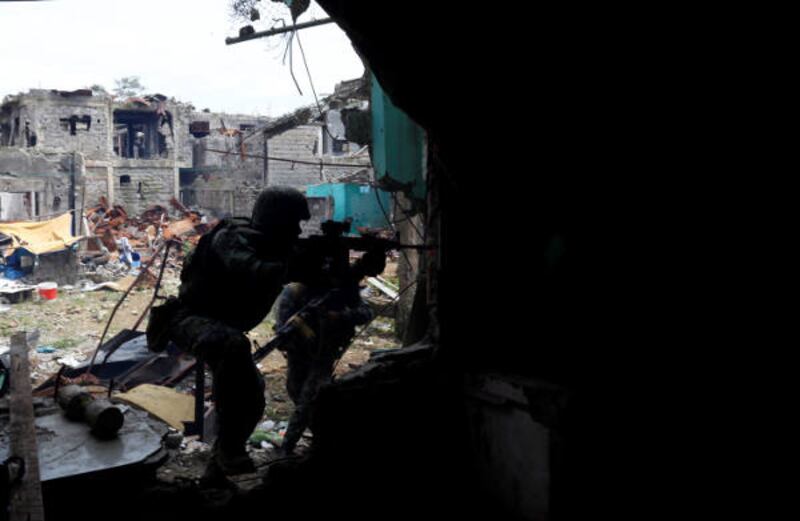Weary Philippine troops on Thursday pushed their way closer to enemy-held territory amid the ruins of Marawi, as the military appeared to have seized strategic positions almost four months after Islamic State-linked militants took over this southern city.
Troops allowed BenarNews reporters to join them inside Marawi’s main battle area, giving them permission to observe U.S.-trained Filipino commandos while they moved around the districts of Mapandi and Lilod, two areas controlled by the gunmen from May 23 until recently.
“We have reduced their maneuver space,” Brig. Gen. Rolando Bautista, commander of the ground troops, told reporters, referring to the areas under control of the militants. “That is our final push. We concentrate whatever personnel, whatever capability we have.”
As dusk settled on the ruined city, Maj. Rick Ganuelas of the Marines 1st Brigade scanned the horizon with night-vision goggles and told his men to remain vigilant against Abu Sayyaf and Maute group fighters.
In the distance, heavy exchange of gunfire could be heard as an American P-3 Orion flew overhead and gathered intelligence information, which would be relayed to the Philippine troops on the ground.
The dull thud of bombs being dropped by Philippine Air Force planes shook the ground and rattled steel frames of windows.
“We have separate men assigned in daytime, as well nighttime,” Ganuelas told BenarNews, referring to the incessant firefights.
He described the fight as intense, but troops on the frontline were continuing to advance slowly.
“We lost two of our boys the other day during an assault,” he said.
A destroyed city
Besides him, troops took positions on pockmarked ruins that used to be homes, before Marawi was abandoned by its estimated 200,000 residents.
Nearby, the city’s old Grand Mosque stands abandoned, guarded by troops who had pushed out a rebel unit that took refuge in the concrete building before they fled two weeks ago.
Its once vibrant-green color has been scarred, and while the building stands erect, its main dome and turrets bore evidence of the heavy exchange of fire.
Abandoned vehicles lay in ruins, torched by the gunmen or destroyed by the constant bombing runs that so far had failed to dislodge the militants from their positions.
Stray dogs gnawed on scattered human bones, which were later gathered by military forensics experts, BenarNews reporters said.

Uncertain of number of enemies still fighting
The military believes that Isnilon Hapilon, a leader of one faction of the local Abu Sayyaf group and the acknowledged head of the Islamic State here, is carrying on with fighting in the area.
He is believed to be backed by fighters from the Middle East and Southeast Asia, as well as local fighters from the Maute group, a small gang founded by members of a local Filipino Muslim family.
The military estimates that about 40 to 60 militants are still engaged in the fighting.
While the heavy firepower from the militant side has ebbed, they are still able to push back soldiers, with strategically positioned snipers able to pin down government assault units.
Fate of hostages unknown
Col. Romeo Brawner, commander of the Joint Task Group Marawi, said “the sustained bombardment from airstrikes” and daily assaults were being carried out carefully to ensure that no hostages were harmed.
But there was no word about the fate of the dozens of hostages believed to be held by the gunmen. One of them was Marawi’s Roman Catholic priest, who was last seen on a video pleading to President Rodrigo Duterte to stop the air raids.
On Thursday morning, the Marines marched on streets littered with debris from the battle, and made sure that none of the shattered buildings were re-occupied by the gunmen.
At least 148 soldiers and 660 militants have died since the fighting began. At least 45 civilians were also killed by militants, officials said.
The United States and Australia are helping in intelligence gathering, and Malaysia, Indonesia and Singapore have offered counter-terror support through marine patrols to ensure that militants from Marawi do not cross sea borders.
At least two jet fighters carried out air strikes in the area early Thursday, Brawner, the task force commander, said.
“Our airstrikes against our enemies’ defense positions continue on a daily basis, but we are careful not to hit the mosques,” Brawner said.
“Their hostages are indispensable,” he said. “As much as possible, they will keep their hostages alive to use them as their human shields.”
